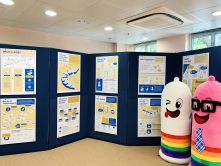Dialogue Script of Video "Knowing AIDS"
|
Boy: Hmm what has AIDS got to do with me ? Girl: But what exactly is AIDS ? Boy: So how come we'd get AIDS ? Girl: and what can we do to prevent getting AIDS ? Boy: Will we get AIDS through normal day to contact like eating and drinking with people ? … Girl: So how do we find out if we've got AIDS or not ? Boy: Gosh what if the AIDS test shows that I have AIDS ? Girl: Oh no, can AIDS be cured ? Boy: You may think AIDS has nothing to do with you, but in fact, anybody can contract HIV Virus ! Girl: But if we know more about it, we can take precautions or detect it in time to receive treatment, this will prevent AIDS from spreading. Boy: OK let me tell you briefly what AIDS really is! Girl: Right, knowledge is power! Both: Hmm! Voice over: AIDS stands for "Acquired Immunodeficiency Syndrome". AIDS is caused by a virus known as Human Immunodeficiency Virus, in short, HIV. HIV can destroy the body's immune system, so people who are infected with HIV will gradually lose their ability to fight against disease, this leads to complications and finally death. Most people who have been infected by HIV do not show any symptoms in the early stage of infection, they can look and feel healthy for many years, but they can transmit the virus to someone else. Some people, in the early stage of infection, will experience symptoms of fatigue, fever, loss of appetite, weight loss, diarrhea, night sweats and swollen lymph glands ! If the HIV infected person do not receive treatment for the disease, approximately 50% of them will develop AIDS within 10 years. Girl: AH ! Boy: Oh !.. Does that mean, when one is Infected with HIV, it doesn't mean that they have AIDS at all ? Girl: Hmm, that's right, people with HIV – their immune system will slowly weaken, bacteria or viruses which rarely pose a threat to healthy people, are able to attack the weakened immune system, therefore causing different infections, and these are known as "opportunistic infections". Voice over: These opportunistic infections include Pneumocystis Carinii pneumonia and mycobacterium tuberculosis. The nervous system & the intestinal system can be infected as well, for example, retinitis & Intestinal Tract infection caused by Cytomegalovirus and infection of the brain caused by Toxoplasmosis. Boy: Oh gosh so what am I gonna do ? Girl: Come on don't panic, under normal circumstances these opportunistic infections can usually be controlled by medication. Boy: But will I get infected when I go out ? Voice over: Well don't worry , HIV cannot be transmitted thru' casual day-to-day contact between people, like touching in a working environment, eating at the same table, sharing a toilet, shaking hands, hugging , sneezing or coughing ; and neither can it be transmitted thru' insect bites. There are only three routes in which HIV can be transmitted. Voice over: First, sexual contact with an infected person, whether it be oral sex, vaginal sex or anal sex. And One has an equal chance to get HIV either through heterosexual or homosexual contact. Voice over: According to statistics in Hong Kong, 80% of HIV is transmitted via sexual contact. Therefore, if you are not sure whether your partner is infected or not, then make sure you use a condom correctly Voice over: The second route is thru' blood transfusion via injection. The virus can be transmitted thru' contaminated needles or syringes & other skin piercing instruments, for example, sharing needles with an infected drug users, or thru' transfusions of infected blood or blood products Boy: Will we get infected with HIV by donating Blood? Girl: Well why don't we go and take a look! Voice over: The Red Cross carries out HIV antibody tests for blood donors, as well as a series of measures, including advising high – risk individuals who maybe exposing themselves to the risk of infection not to give blood… Voice over: You will not get infected with HIV by giving blood, because all the instruments used are disposable and is immediately discarded afterwards Boy: Good so we don't have to worry about it. Girl: Yes but for some people, they should be aware ! Nurse: Drug users should seek help at drug rehabilitation centers, never share needles or syringes with someone else. If it's unavoidable , then make sure you clean the needles or syringes properly – with bleach and fresh clean water, before you use them. Boy/Girl: Hmm…. Girl: But of course, it's best to quit drugs! Nurse: Hmm Boy: Can we stop from getting infected in our daily lives? Nurse: Sure you can. Voice over: In our everyday life, we should avoid sharing tooth brushes or razors with someone else. When tattooing or ear-piercing, make sure all the equipment is properly sterilized. When dressing an open wound, we should always wear disposable latex gloves. If you have a cut yourself, you should have it properly dressed at once. Boy: Aha! So we just need to be cautious! Girl: Hmm! Boy: Oh, what's the third route of transmission? Girl: Hmm! Voice over: The third route is transmitted from an infected mother to her child during pregnancy or delivery, or in infancy thru' breastfeeding. The chances of getting infected are approx. 15% to 40%. So pregnant women or women who plan to become pregnant, who suspect they're HIV positive, should be tested for HIV as soon as possible. If HIV infected women receive antiretroviral treatment during their pregnancy and delivery; and after delivery, avoid breastfeeding the baby, then the chances of the baby getting infected can be reduced to around 8% Boy: Hey tell me is HIV a tough virus to kill them? Girl: Well AIDS is hard to cure, so I guess HIV must be hard to kill. Boy: Hmm! Nurse: But you're wrong. Boy: Oh? Voice over: HIV is in fact a vulnerable virus, it cannot survive alone outside the human body. It can't survive in heat, antiseptics, domestic bleach or even when exposed to air. So we needn't be overly concerned, as long as we treat open wounds & blood carefully, and practice safer sex, there is very little chance of us contracting HIV. If you suspect that you are at risk, then you should get tested for HIV as soon as possible, If your blood is found to carry HIV antibodies, then the test result will be positive, this means you have been infected with HIV. Boy: But antibodies can protect us from getting sick, right? Voice over: The HIV antibody is different, it cannot protect us. There could be several possibilities if HIV antibodies are not detected in the blood test. One, you are not infected. Two, you have been infected with HIV, and you can transmit HIV to other people, but your body hasn't produced enough antibodies yet, so the test fails to detect them. Voice over: Some people may take only 3 weeks to produce the antibodies after being infected, and some may go to 3 months before it can be detected. This is called the Window Period. Girl: Do we have to give our names for the HIV antibody test ? Boy: Yeah, and how much will it cost ? Voice over: The Department of Health's "Special Preventive Programme" provides anonymous HIV antibody test, all information is in strictly confidential. Furthermore, it's completely free! Voice over: The AIDS unit of Department of Health operates an AIDS Hotline 2780 2211 where you can get recorded information on HIV / AIDS. You can also choose to talk to counsellors and make an appointment for HIV antibody test. Voice over: Remember, if in doubt, then take the HIV antibody test as soon as possible, this will avoid pointless worrying and guessing, and if the test shows that you really have been infected, you can get early treatment. Both: So, how can AIDS be cured then? Voice over: At present, there are quite a few medication to suppress the HIV virus from replicating in the body. After entry in the body, the HIV specifically attaches and destroys the CD4 cell. HIV possess an enzyme, reverse transcriptase, which copies the RNA into DNA after entry. In this way, the viral genetic materials can be integrated into the host cell genome for life and replicate with them. The goal of antiretroviral therapy is to reduce the level of HIV RNA to as low as possible and as long as possible. HIV Strains can rapidly mutate thus making HIV more complicated to treat and hampering the development of vaccine against it. To prevent HIV mutation, the HIV infected person must follow strict drug adherence programme. Recently, there've been great leaps in the development of drugs to treat HIV. The "cocktail treatment" which is the Highly Active Antiretrovial Therapy can decrease the speed with which HIV replicates, and strengthen the HIV infected immune systems to slow down the development of AIDS; the results are more obvious if treatment is received early. This has given great encouragement to both patients and the medical community Boy: But you know the worst thing is not getting the disease. The worst is being discriminated against! Girl: Hmm, people are scared of AIDS because they don't really understand the disease… Now that we've learned more about it, we shouldn't be afraid of it! Besides AIDS is just another disease, it's not different from suffering with other disease. Both: Hmm Boy: That's right, AIDS is just another disease, AIDS patients are just like other patients, so we should not discriminate AIDS patients! Girl: That's right we should accept them, show them care and support, so that they would be more encouraged to face the disease & seek treatment, only then can AIDS be effectively controlled! Both: Hmm! : To Prevent AIDS, Take the First Step ! Boy: If you want to know more about AIDS or get information on it… Girl: You're welcome to visit us at the Red Ribbon Centre! End super: Routes of HIV Transmission: 1. Sexual Contact, 2. Blood Contact, 3. Mother to Infant End super: Prevention of HIV Infection: 1. Practise Safer Sex, Use a Condom Properly, 2. Don't Share Needles, 3. Proper Wound Management End super: Access to HIV antibody test: AIDS Hotline 2780 2211, Social Hygiene Clinics, Hong Kong AIDS Foundation 25130513, Private practitioners |













